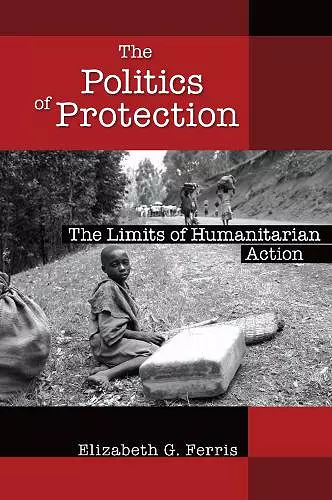The Politics of Protection
The Limits of Humanitarian Action
Format:Paperback
Publisher:Bloomsbury Publishing PLC
Published:30th Mar '11
Currently unavailable, and unfortunately no date known when it will be back

" The Politics of Protection is a brilliant book, full of insights on one of the most complex tasks facing humanitarian organizations: how to protect civilians who find themselves caught in the midst of violence. Through her personal field experience, and thanks to a meticulous review of existing literature, Elizabeth Ferris captures the essence of, and the dilemmas surrounding, the notion of protection in situations of crisis and conflict. She details the efforts of humanitarian organizations to confront both new and old challenges, while simultaneously striving to enhance the protection of civilians affected by conflict and violence." --Pierre Gentile, Head of Unit, Protection of Civilian Population, International Committee of the Red Cross "Protection, the author says, is the essence of the humanitarian enterprise. Weaving masterfully into a compelling narrative the germane aspects of three major bodies of international law, copious and disparate initiatives of the United Nations, and the challenges confronting the humanitarians who would do protection today, she has done us all a profound service." --Antonio Guterres, UN High Commissioner for Refugees "USAID welcomes this book as an excellent overview of humanitarian actors' engagement in protection, as well as the challenges and limits of our work. USAID is committed to promoting the protection of people affected by disasters and conflicts, and this book serves as a reminder of why this work is important, why it is difficult, and why we must continually strive to do it better." --Nancy Lindborg, USAID Assistant Administrator for Democracy, Conflict, and Humanitarian Assistance
Examines inconsistent ways in which protection is defined and applied. For example, why do certain groups receive international protection while other equally needy groups do not? Ferris argues that the protection paradigms currently in use are inadequate to meet the challenges of the future, such as climate change, protracted displacement, and the changing nature of warfare.
For the past decade, humanitarian actors have increasingly sought not only to assist people affected by conflicts and natural disasters, but also to protect them. At the same time, protection of civilians has become central to UN peacekeeping operations, and the UN General Assembly has endorsed the principle that the international community has the ""responsibility to protect"" people when their governments cannot or will not do so. Elizabeth Ferris explores the evolution of the international community's understandings of protection, with a particular emphasis on the humanitarian community.
""Protection"" is a noble word, with positive connotations, but what does it actually mean in practice? Does providing assistance to vulnerable people protect them, for example? Does monitoring the number of rapes protect women? Does increased engagement in protection activities by humanitarian agencies jeopardize the cornerstone humanitarian principles of neutrality and impartiality?
In The Politics of Protection, Ferris examines inconsistent ways in which protection is defined and applied. For example, why do certain groups receive international protection while other equally needy groups do not? Her case studies, ranging from Iraq to Katrina, illustrate the challengesand limitationsof protecting vulnerable populations from the ravages of war and natural disasters. Ferris argues that the protection paradigms currently in use are inadequate to meet the challenges of the future, such as climate change, protracted displacement, and the changing nature of warfare.
" The Politics of Protection is a brilliant book, full of insights on one of the most
complex tasks facing humanitarian organizations: how to protect civilians who find
themselves caught in the midst of violence. Through her personal field experience,
and thanks to a meticulous review of existing literature, Elizabeth Ferris captures
the essence of, and the dilemmas surrounding, the notion of protection in situations
of crisis and conflict. She details the efforts of humanitarian organizations to
confront both new and old challenges, while simultaneously striving to enhance
the protection of civilians affected by conflict and violence." —Pierre Gentile, Head of Unit, Protection of Civilian Population, International Committee of the Red Cross
"Protection, the author says, is the essence of the humanitarian enterprise. Weaving
masterfully into a compelling narrative the germane aspects of three major bodies
of international law, copious and disparate initiatives of the United Nations, and
the challenges confronting the humanitarians who would do protection today, she
has done us all a profound service." —António Guterres, UN High Commissioner for Refugees
"USAID welcomes this book as an excellent overview of humanitarian actors'
engagement in protection, as well as the challenges and limits of our work. USAID
is committed to promoting the protection of people affected by disasters and
conflicts, and this book serves as a reminder of why this work is important, why it
is difficult, and why we must continually strive to do it better." —Nancy Lindborg, USAID Assistant Administrator for Democracy, Conflict, and Humanitarian Assistance
ISBN: 9780815721376
Dimensions: 229mm x 151mm x 20mm
Weight: 535g
382 pages